ASUS TUF Z87 Gryphon Review
by Ian Cutress on February 3, 2014 10:00 AM EST- Posted in
- Motherboards
- Asus
- Z87
- TUF
System Benchmarks
Rightmark Audio Analyzer 6.2.5
In part due to reader requests, we are pleased to include Rightmark Audio Analyzer results in our benchmark suite. The premise behind Rightmark:AA is to test the input and output of the audio system to determine noise levels, range, harmonic distortion, stereo crosstalk and so forth. Rightmark:AA should indicate how well the sound system is built and isolated from electrical interference (either internally or externally). For this test we connect the Line Out to the Line In using a short six inch 3.5mm to 3.5mm high-quality jack, turn the OS speaker volume to 100%, and run the Rightmark default test suite at 192 kHz, 24-bit. The OS is tuned to 192 kHz/24-bit input and output, and the Line-In volume is adjusted until we have the best RMAA value in the mini-pretest. We look specifically at the Dynamic Range of the audio codec used on board, as well as the Total Harmonic Distortion + Noise.
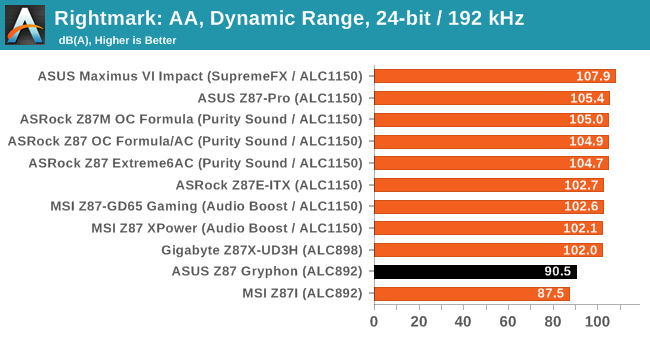
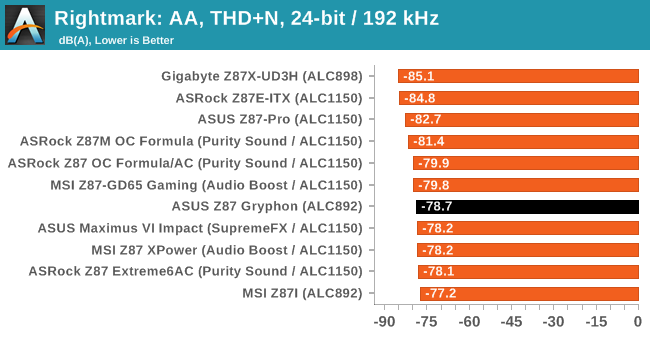
Using the ALC892 for the Gryphon seems the right choice of codec, however it is limiting in terms of SNR compared to the ALC898 and above models.
USB Backup
For this benchmark, we run CrystalDiskMark to determine the ideal sequential read and write speeds for the USB port using our 240 GB OCZ Vertex3 SSD with a SATA 6 Gbps to USB 3.0 converter. Then we transfer a set size of files from the SSD to the USB drive using DiskBench, which monitors the time taken to transfer. The files transferred are a 1.52 GB set of 2867 files across 320 folders – 95% of these files are small typical website files, and the rest (90% of the size) are the videos used in the WinRAR test. In an update to pre-Z87 testing, we also run MaxCPU to load up one of the threads during the test which improves general performance up to 15% by causing all the internal pathways to run at full speed.
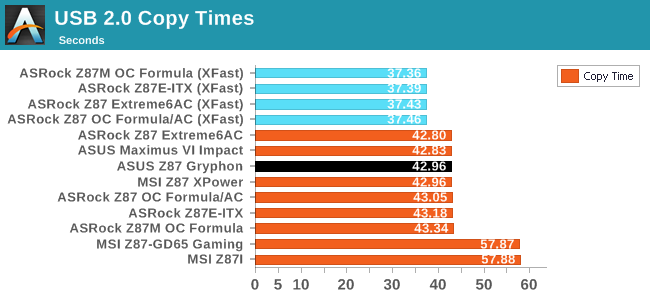
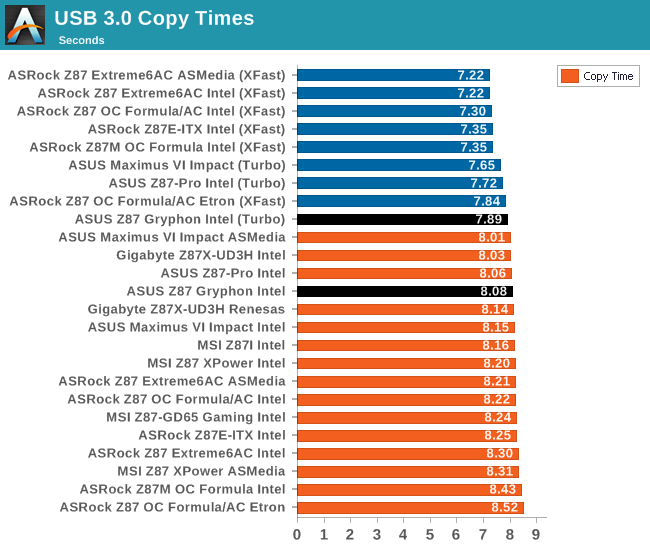
USB 3.0 Turbo boost provides an ample improvement in peak read speeds, although this does not translate in to much gain in the copy test.
DPC Latency
Deferred Procedure Call latency is a way in which Windows handles interrupt servicing. In order to wait for a processor to acknowledge the request, the system will queue all interrupt requests by priority. Critical interrupts will be handled as soon as possible, whereas lesser priority requests, such as audio, will be further down the line. So if the audio device requires data, it will have to wait until the request is processed before the buffer is filled. If the device drivers of higher priority components in a system are poorly implemented, this can cause delays in request scheduling and process time, resulting in an empty audio buffer – this leads to characteristic audible pauses, pops and clicks. Having a bigger buffer and correctly implemented system drivers obviously helps in this regard. The DPC latency checker measures how much time is processing DPCs from driver invocation – the lower the value will result in better audio transfer at smaller buffer sizes. Results are measured in microseconds and taken as the peak latency while cycling through a series of short HD videos - under 500 microseconds usually gets the green light, but the lower the better.
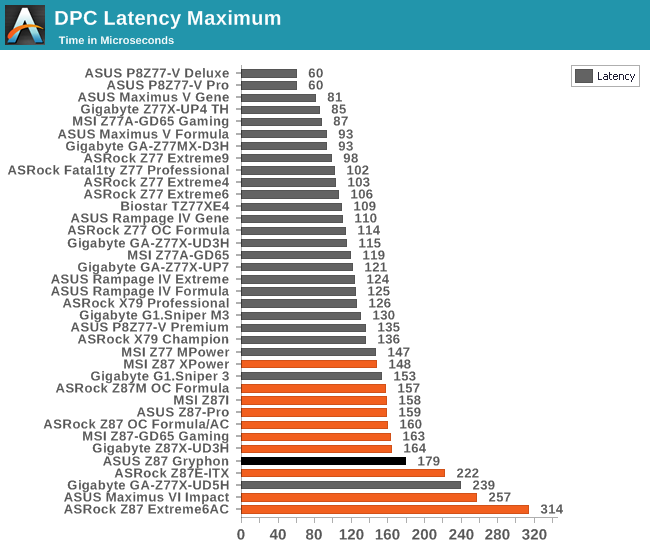
Once again the Z87 platform gives another 150+ result, showing that there is something fundamental with it causing a higher peak DPC than older Intel platforms.










62 Comments
View All Comments
FractinJex - Monday, February 3, 2014 - link
Im currently running this board in a CoolerMaster N200 mATX build and its awesome! Just like the sabertooth its rock solid and built to last until upgrade 4-5 years...i7 4770
MSI GTX 780 Ti 1225mhz
8gb 2400 Gskill
AX860
Firestrike score - 11313
tim851 - Monday, February 3, 2014 - link
>its rock solid and built to last until upgrade 4-5 years...<Yeah, unlike all the normal motherboards that explode after 3 years... *rollseyes*
5thaccount - Monday, February 3, 2014 - link
Yeah, haha, all my systems last far beyond 5 years - but that's because I refuse to use ASUS motherboards! ASUS hasn't made quality motherboards for 15 years. Every month I see hundreds of ASUS motherboards thrown out because they died or have some problems. MSI also has a high failure rate, but unlike ASUS, they actually honor their warranty.munim - Monday, February 3, 2014 - link
Yeah, haha, all my systems last far beyond 5 years - but that's because I refuse to use MSI motherboards! MSI hasn't made quality motherboards for 15 years. Every month I see hundreds of MSI motherboards thrown out because they died or have some problems. Asus also has a high failure rate, but unlike MSI, they actually honor their warranty.maximumGPU - Tuesday, February 4, 2014 - link
Love it!Senti - Monday, February 3, 2014 - link
Why so much hate towards Asus to even spam the same nonsense (zero examples) from multiple accounts?Asus does make nice boards, just a bit overpriced maybe.
My oldest MB still in use is Asus K8N4-E Deluxe: that's 8 years of use (with overclocking too)! Just had to replace CMOS battery recently.
FractinJex - Monday, February 3, 2014 - link
They are both trolls....I handle multiple MB vend/manf. on a daily basis and Asus is still one of the best consumer/enthusiast brands available simply as that....MSI is right up there as well with their xpower etcEtsp - Monday, February 3, 2014 - link
munim isn't supporting 5thaccount, they are pointing out how ridiculous 5thaccount's post is, by using the same exact wording and swapping the brands.Samus - Monday, February 3, 2014 - link
Lmfao is this guy serious? Asus has always made some of the best motherboards going way back to the 80's.5thaccount - Tuesday, February 4, 2014 - link
My hate is strictly for ASUS' motherboards and RMA process. Everything else I've seen from ASUS has been of reasonable to excellent quality. 'munim' is someone not related to me. I'm not going to give specific examples or identify myself, but since the 90s I've worked as a technician, at very large reseller (at one time was the largest reseller of video cards in the world - although we sold every other part too), and currently at an electronics recycling company. I see things on an enormous scale and from a unique perspective. We see tons of the latest technology running through our doors, and ASUS motherboards are a running joke (from my experience their reliability has been spotty since their Socket A / 462 boards - prior to that they were bulletproof). Anyhow, no one has to believe a word of what I just said - won't affect me one way or the other.